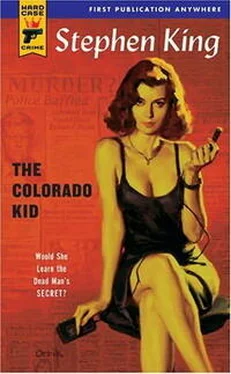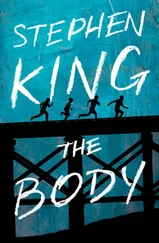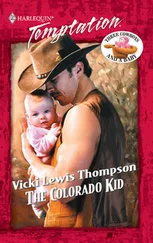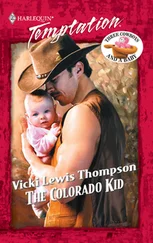Stephen King
The Colorado Kid
After deciding he would get nothing of interest from the two old men who comprised the entire staff ofThe Weekly Islander, the feature writer from the BostonGlobe took a look at his watch, remarked that he could just make the onethirty ferry back to the mainland if he hurried, thanked them for their time, dropped some money on the tablecloth, weighted it down with the salt shaker so the stiffish onshore breeze wouldn’t blow it away, and hurried down the stone steps from The Grey Gull’s patio dining area toward Bay Street and the little town below. Other than a few cursory gleeps at her breasts, he hardly noticed the young woman sitting between the two old men at all.
Once theGlobe writer was gone, Vince Teague reached across the table and removed the bills—two fifties—from beneath the salt shaker. He tucked them into a flap pocket of his old but serviceable tweed jacket with a look of unmistakable satisfaction.
“What are youdoing?” Stephanie McCann asked, knowing how much Vince enjoyed shocking what he called “her young bones” (how much they both did, really), but in this instance not able to keep the shock out of her voice.
“What does it look like?” Vince looked more satisfied than ever. With the money gone he smoothed down the flap over the pocket and took the last bite of his lobster roll. Then he patted his mouth with his paper napkin and deftly caught the departedGlobe writer’s plastic lobster bib when another, fresher gust of saltscented breeze tried to carry it away. His hand was almost grotesquely gnarled with arthritis, but mighty quick for all that.
“It looks like you just took the money Mr. Hanratty left to pay for our lunch,” Stephanie said.
“Ayuh, good eye there, Steff,” Vince agreed, and winked one of his own at the other man sitting at the table. This was Dave Bowie, who looked roughly Vince Teague’s age but was in fact twentyfive years younger. It was all a matter of the equipment you got in the lottery, was what Vince claimed; you ran it until fell apart, patching it up as needed along the way, and he was sure that even to folks who lived a hundred years—as he hoped to do—it seemed like not much more than a summer afternoon in the end.
“Butwhy?”
“Are you afraid I’m gonna stiff the Gull for the tab and stick Helen with it?” he asked her.
“No…who’s Helen?”
“Helen Hafner, she who waited on us.” Vince nodded across the patio where a slightly overweight woman of about forty was picking up dishes. “Because it’s the policy of Jack Moody—who happens to own this fine eating establishment, and his father before him, if you care—”
“I do,” she said.
David Bowie,The Weekly Islander ’s managing editor for just shy of the years Helen Hafner had lived, leaned forward and put his pudgy hand over her young and pretty one. “I know you do,” he said. “Vince does, too. That’s why he’s taking the long way around Robin Hood’s barn to explain.”
“Because school is in,” she said, smiling.
“That’s right,” Dave said, “and what’s nice for old guys like us?”
“You only have to bother teaching people who want to learn.”
“That’s right,” Dave said, and leaned back. “That’s nice.” He wasn’t wearing a suitcoat or sportcoat but an old green sweater. It was August and to Stephanie it seemed quite warm on the Gull’s patio in spite of the onshore breeze, but she knew that both men felt the slightest chill. In Dave’s case, this surprised her a little; he was only sixtyfive and carrying an extra thirty pounds, at least. But although Vince Teague might look no more than seventy (and an agile seventy at that, in spite of his twisted hands), he had turned ninety earlier that summer and was as skinny as a rail. “A stuffed string” was what Mrs. Pinder,The Islander ’s parttime secretary, called him. Usually with a disdainful sniff.
“The Grey Gull’s policy is that the waitresses are responsible for the tabs their tables run up until those tabs are paid,” Vince said. “Jack tells all the ladies that when they come in lookin for work, just so they can’t come whining to him later on, sayin they didn’t know that was part of the deal.”
Stephanie surveyed the patio, which was still halffull even at twenty past one, and then looked into the main dining room, which overlooked Moose Cove. There almost every table was still taken, and she knew that from Memorial Day until the end of July, there would be a line outside until nearly three o’clock. Controlled bedlam, in other words. To expect every waitress to keep track of every single customer when she was busting her ass, carrying trays of steaming boiled lobsters and clams—
“That hardly seems…” She trailed off, wondering if these two old fellows, who’d probably been putting out their paper before such a thing as the minimum wage even existed, would laugh at her if she finished.
“Fair might be the word you’re lookin for,” Dave said dryly, and picked up a roll. It was the last one in the basket.
Fair came outfayyuh, which more or less rhymed withayuh, the Yankee word which seemed to mean bothyes andis that so. Stephanie was from Cincinnati, Ohio, and when she had first come to MooseLookit Island to do an internship onThe Weekly Islander, she had nearly despaired…which, in downeast lingo, also rhymed withayuh. How could she learn anything when she could only understand one word in every seven? And if she kept asking them to repeat themselves, how long would it be before they decided she was a congenital idiot (which on MooseLook was pronouncedijit, of course)?
She had been on the verge of quitting four days into a fourmonth University of Ohio postgrad program when Dave took her aside one afternoon and said, “Don’t you quit on it, Steffi, it’ll come to ya.” And it had. Almost overnight, it seemed, the accent had clarified. It was as if she’d had a bubble in her ear which had suddenly, miraculously popped. She thought she could live here the rest of her life and never talk like them, but understand them? Ayuh, that much she could do, deah.
“Fair was the word,” she agreed.
“One that hasn’t ever been in Jack Moody’s vocabulary, except in how it applies to the weather,” Vince said, and then, with no change of tone, “Put that roll down, David Bowie, ain’t you gettin fat, I swan, sooee, pigpigpig.”
“Last time I looked, we wa’ant married,” Dave said, and took another bite of his roll. “Can’t you tell her what’s on what passes for your mind without scoldin me?”
“Ain’t he pert?” Vince said. “No one ever taught him not to talk with his mouth full, either.” He hooked an arm over the back of his chair, and the breeze from the bright ocean blew his fine white hair back from his brow. “Steffi, Helen’s got three kids from twelve to six and a husband that run off and left her. She don’t want to leave the island, and she can make a go of it—just—waitressin at The Grey Gull because summers are a little fatter than the winters are lean. Do you follow that?”
“Yes, absolutely,” Stephanie said, and just then the lady in question approached. Stephanie noticed that she was wearing heavy support hose that did not entirely conceal varicose veins, and that there were dark circles under her eyes.
“Vince, Dave,” she said, and contented herself with just a nod at the pretty third, whose name she did not know. “See your friend dashed off. For the ferry?”
“Yep,” Dave said. “Discovered he had to get back downBoston.”
“Ayuh? All done here?”
“Oh, leave on a bit,” Vince said, “but bring us a check when you like, Helen. Kids okay?”
Helen Hafner grimaced. “Jude fell out of his treehouse and broke his arm last week. Didn’t he holler! Scared me bout to death!”
Читать дальше









